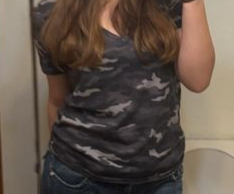In these days of conflict in Israel, local survivor of Bosnian War reflects on lessons for all

Nadira Jusufovic, a health assistant at Hansen Elementary, lived through the war in Bosnia in the ’90s, and she sees similarities in what’s happening now with Palestine in the Israel conflict.
Can you share your experiences from the Bosnian War and how it has affected your life?
“I was in my early 20s during the Bosnian War in the 1990s. Those years were incredibly difficult and traumatic for me and my family. I got married and had a baby during that time, which should have been a joyous occasion, but it was overshadowed by the conflict. We experienced the horrors of war, including violence, loss of loved ones and the constant fear for our safety. The war forced us to leave our home country, leaving behind the only life we knew.”
What are your thoughts on the significance of acknowledging and remembering the Bosnian genocide?
“Acknowledging and remembering the Bosnian genocide is of utmost importance. It’s a way to honor the memory of those who suffered and lost their lives during the war. By remembering and acknowledging the atrocities, we hope to prevent such horrors from happening again in the future and ensure that justice is served for the victims and their families.”
How do you see the parallels or differences between what happened in Bosnia and the ongoing conflict in Palestine?
“While the specific circumstances and historical context of Bosnia and Palestine differ, there are some parallels. Both conflicts involve territorial disputes, ethnic and religious tensions, and displacement of civilian populations. However, the root causes and dynamics of each conflict are unique, and any comparison should be made carefully, considering the distinct historical and political contexts.”
Do you believe that the international community’s response to the Bosnian genocide was adequate, and how does that compare to their response to other conflicts, like the one in Palestine?
“The international community’s response to the Bosnian genocide remains a subject of debate. Many believe that it was inadequate and that more could have been done to prevent the suffering. Comparing responses to different conflicts, like Palestine, is complex due to the unique circumstances and geopolitical factors involved in each case.”
How do you feel about the importance of raising awareness about the Bosnian genocide in the context of global human rights issues?
“Raising awareness about the Bosnian genocide is vital in the context of global human rights issues. It serves as a reminder of the devastating consequences of failing to intervene in conflicts and protect civilians. It also emphasizes the need for international accountability and prevention of such atrocities in the future.”
What lessons do you think the world should learn from the Bosnian genocide to prevent similar tragedies in the future?
“The world should learn several critical lessons from the Bosnian genocide. These include the importance of early intervention to prevent conflict escalation, the need for effective peacekeeping and humanitarian efforts, and the value of justice and accountability for perpetrators of war crimes.”
Can you share your thoughts on the challenges faced by survivors in terms of healing and reconciliation in post-conflict Bosnia?
“Survivors in post-conflict Bosnia face immense challenges. Healing from physical and emotional trauma is a long and arduous journey. Reconciliation is complicated due to deep-seated divisions and mistrust in society. Rebuilding lives and communities takes time and sustained efforts, including initiatives for truth and reconciliation.”
In your opinion, what role can individuals and nations play in promoting peace and justice, both in Bosnia and in conflicts like the one in Palestine?
“Individuals and nations can play a vital role in promoting peace and justice by supporting diplomatic efforts, providing humanitarian aid, advocating for human rights and pressuring for accountability for war crimes. International cooperation and a commitment to upholding human rights are essential.”
How do you think storytelling and personal narratives can help in understanding the impact of war and conflict on individuals and communities?
“Personal narratives and storytelling are powerful tools for understanding the human side of war and conflict. They help convey the emotional and psychological toll on individuals and communities, fostering empathy and raising awareness about the lasting impact of such experiences.”
What are your hopes for a more peaceful and just future, not only for Bosnia but for other regions experiencing conflict and suffering as well, like Palestine?
“My hope is for a more peaceful and just future, not only for Bosnia but for all regions experiencing conflict and suffering. I hope that the lessons learned from the Bosnian War can contribute to preventing similar tragedies elsewhere, and that the international community will work tirelessly to promote peace, justice and human rights worldwide.”









You must be logged in to post a comment Login